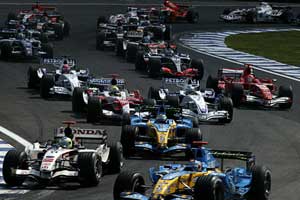NOVEMBER 8, 2006
F1 and the car manufacturers

It has been a wild couple of days in the automotive industry with two chief executives of the seven largest car companies being replaced and while this may all seem to be a long away from the world of Formula 1, it is never easy to predict whether it will ultimately be significant. General Motors and Ford are the largest and third largest car companies in the world but neither is involved in F1. GM has never been involved (beyond a few design studies) while Ford has made so many mistakes in the past that its executives are terrified by Grand Prix racing. It is simply too hard for a big corporation to handle. Toyota, the world's number two car manufacturer, is in F1 but it is not doing very well. F1 people will tell you that this is because the corporate thinking in Toyota is the problem and that in order to win in F1 the team needs to be more willing to take risks. That is probably true but no corporate decision-maker is going to sacrifice his career by going out on a limb and so Toyota will probably remain less successful than it should be. Renault, which in league with Nissan is the fourth biggest car company in the world, seems to have a much better understanding of how to get things done - having made all the mistakes back in the 1970s and 1980s when its F1 was not sufficiently independent. Nowadays Renault management leave Flavio Briatore in control, knowing full well that if it all goes horribly wrong they have a perfect fall-guy. DaimlerChrysler (number six in the world) has played a hand-off role up to now with McLaren but seems to want to get more control, apparently in the belief that it will do a better job than the current McLaren people. Of the others in F1 Honda is only the eighth biggest player in the industry but seems to be getting to a situation in which its F1 team is running well and without intervention from the main company. Fiat, which lags behind in the industry in 11th place, has enjoyed much success in F1 with Ferrari but is not so sure that this can be continued in the future with ever-increasing budgets and a new management which may not be as good as the old regime. BMW (13th in the industry) is rapidly moving up the F1 ranks under the guidance of Dr Mario Theissen. The two names missing from this list are Volkswagen and Peugeot, fifth and seventh in terms of global production. Both Peugeot and Volkswagen could gain much from F1 if they had suitable programmes. Both have rather drab images and VW has never been in F1 although some of its subsidiaries have the potential to be "sexy" brands and have racing heritage. VW has invested a huge amount of money in recent years to revive the Bugatti name with the $1.5m Veyron, which went into production at the end of last year, three years behind schedule. The costs of the development of the car - which was designed to be the fastest, most powerful and most expensive car in the world - are far in excess of the income that will be generated by the car, as only 300 will be sold - if, indeed, they can be. The word is that Bugatti will now adopt the same policy as McLaren, and will soon start to produce a less exotic follow-up car in larger numbers and thus ease its way into the luxury car markets where one day money may be made. Peugeot tried F1 in the 1990s as an engine supplier and did not have an enjoyable time. A deal with McLaren was ditched by the team in favour of Mercedes-Benz and Peugeot was shunted off to Jordan in 1995, 1996 and 1997. Peugeot chairman Jacques Calvet decided that Alain Prost would do the job better and switched to the French team in 1998 but after three seasons of failure Peugeot withdrew. It is worth noting that several key players in the early Peugeot F1 programme ended up at Ferrari, an indication that Peugeot might have done better in F1 if the programme had been correctly managed. Jean Todt was originally at Peugeot and proposed an in-house Peugeot F1 team in 1993. The idea was turned down and Todt went off to glory at Ferrari. After giving up on F1, Peugeot went off to dominate the World Rally Championship, initially with the Peugeot brand but more recently with its sister company Citroen. This, however, is a minor achievement in terms of coverage, compared to F1. Nowadays Peugeot continues to trumpet its innovation and technology by trying to win the Le Mans 24 Hours with a diesel engine. Sadly for the French this landmark was achieved this year by VW's Audi. It is worth noting, incidentally, that manufacturers are very confident that Grand Prix racing helps them sell cars. Fiat-owned Alfa Romeo has a long history in Grand Prix racing and recently announced plans to build a car called the Alfa Romeo 8C. This harks back to a racing car of the same name in the 1930s and the design of the car is clearly reminiscent of the racing Alfas of that era. This is a very intelligent programme as it uses an F1 heritage without having to pay F1 bills. The good news is that F1 costs are supposed to be coming down in the future (we will believe that when we see it) and the rewards will be going up thanks to a new financial deal between the teams and the F1 authorities, which begins in 2008.